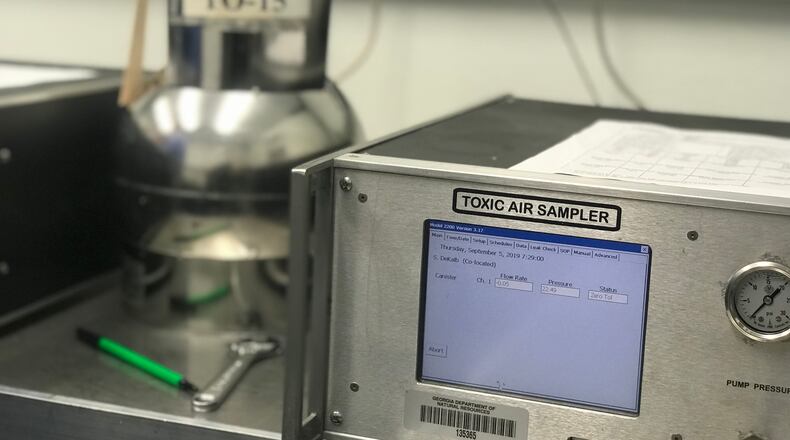The state finalized a deal Tuesday with a Fulton County sterilization plant to reduce its emissions of a cancer-causing gas.
Sterilization Services of Georgia is currently in violation of the state Air Quality Act and will be fined $3,000 per day through the end of January, after missing a deadline to install new pollution controls meant to reduce emissions of ethylene oxide, according to a consent order obtained by The Atlanta Journal-Constitution.
The company uses the gas to sterilize single-use medical devices, and has a permit to legally emit it from a facility off Fulton Industrial Boulevard. The permit requires installation of filters to reduce emissions from the plant by 99 percent.
READ | Fulton ethylene oxide testing shows levels exceeding EPA threshold
If the filters aren’t operational after Jan. 31, the company will have to reduce its use of the ethylene oxide by 25 percent in February, according to the agreement.
The company would have to eliminate its use of the gas in March if the filters still aren’t up and running by Feb. 28, says the agreement signed by Environmental Protection Division chief Richard Dunn and the company’s plant manager earlier this week.
Plant manager Eric Welch declined to answer the AJC’s questions when reached by phone Wednesday.
Robb Pitts, Fulton County Commission chairman, said he is glad the EPD made the deal and supports “their additional measures to safeguard the health of our residents.”
Concerns have grown across the nation and in metro Atlanta about ethylene oxide emissions. Locally, the realization that plants including Sterigenics in Cobb County and Becton Dickinson in Covington had permits to legally emit the gas has sparked town hall meetings, public protests and state air monitoring.
BACKGROUND | Fulton County test air for ethylene oxide in Fulton industrial area
Ethylene oxide came to Georgians' attention over the summer — more than three years after the EPA upgraded its link to cancer. A July report by WebMD and Georgia Health News highlighting potential increased cancer risks at the Sterigenics and BD plants brought the issue forward in the minds of residents and lawmakers.
In early December, nearly all of the air quality test results presented to the Fulton County Commission showed that the amount of ethylene oxide in the area of the Fulton County plant exceeded federal safety standards. The EPA predicts lifetime exposure above its threshold can cause 100 additional cancer cases per 1 million people.
The EPD issued a permit in November that included Sterilization Services of Georgia installing dry bed reactors by the end of the year.
READ | For cancer survivors, Sterigenics raises haunting questions
Richard Peltier, an expert in air pollution exposure at the University of Massachusetts, Amherst, has said dry beds react with the gas and filters the chemical out so it doesn’t leave the plant. The permit requires the dry beds to reduce emissions of the gas through the facility’s back vents.
Sterilization Services of Georgia told the state in mid-December that construction of the dry bed reactors had been delayed.
An AJC investigation found that, until the recent interest, the state Environmental Protection Division has relied solely on the companies to report their emissions. Georgia has a history of being industry-friendly when it comes to environmental regulation. But under pressure from constituents, the state has recently taken a harder line.
Like North Fulton County News Now on Facebook | Follow us on Twitter
Where we are
The Sterilization Services of Georgia is the third facility in metro Atlanta to gain attention for its emissions of ethylene oxide. The chemical is a cancer-causing gas used to sterilize single-use medical devices. The other two plants with permits to legally emit the gas are Sterigenics in Cobb County and Becton Dickinson in Covington. A July report by WebMD and Georgia Health News highlighting potential increased cancer risks from ethylene oxide at the Sterigenics and BD plants worried residents and lawmakers, sparking town hall meetings, public protests and state air monitoring.



